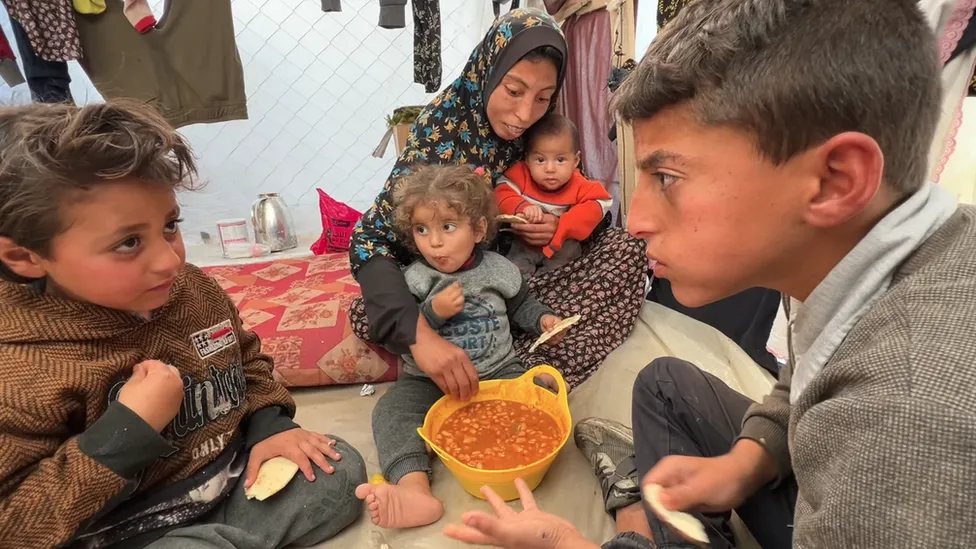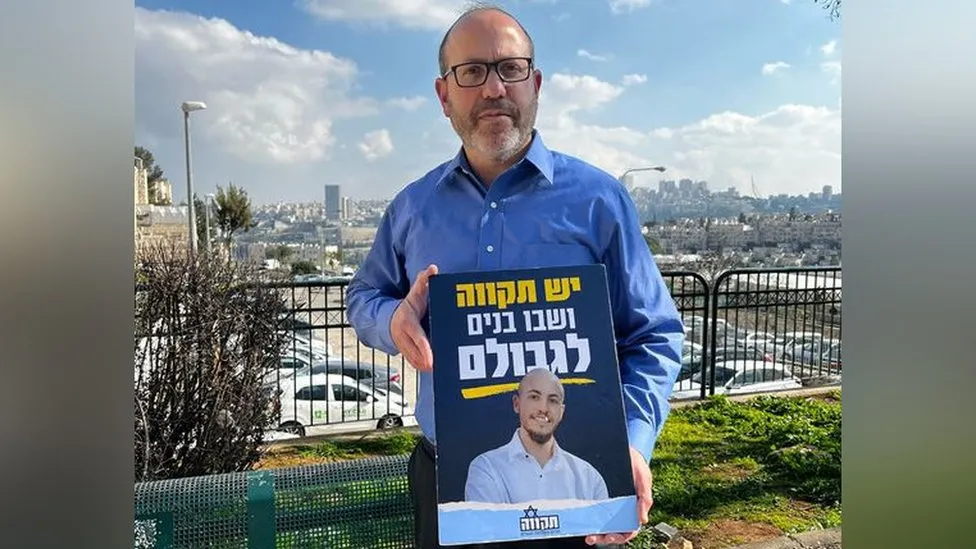Jerusalem, Feb 26: In certain places at certain times, just staying alive is something for a boy to be proud of – let alone going out every day to find the food that keeps your family from starving.
Every morning, Mohammed Zo’rab, 11, goes out into the southern Gaza city of Rafah on a mission.
He takes a big plastic bowl and heads to schools that have become refugee centres and to makeshift camps on the roadside where people suffer like his own family but might still find something to feed the child of strangers.
Mohammed also goes to hospitals where the wounded arrive at all hours, and anywhere else where there might be a pot boiling over an open fire.
“When I go back to my family with this food, they get happy and we all eat together,” he says.
“Sometimes I go empty-handed and I feel sad.”
Mohammed is the eldest of four children and lives with his mother, father and his siblings in a flimsy shelter made of plastic and tarpaulin.
His father, Khaled, roams around Rafah looking for odd jobs to raise five shekels (about $1.38; £1.08) to buy diapers for their two-month-old daughter, Howaida.

Mohammed is one of thousands of children who have become primary food gatherers for their families.
“When the line is crowded and there are almost 100 people in front of me, I sneak between people,” he says, proud of his skill at navigating large crowds without getting into fights.
Back at home, he hands the bowl of baked beans to his mother, Samar, who distributes the food to the other children. She is gaunt and barely eats herself.
“I have cancer in my bones,” she reveals. “I am 31-years-old but when you see me you think I’m 60. I can’t walk.
“If I walk, I get very tired. All my body hurts and I need treatment and nutrition.”
Like so many others, Samar and her family came to Rafah from their home further north in Khan Younis because the Israel Defense Forces (IDF) told them it would be safe. That was three months ago.
Since then, the war has come steadily closer to Rafah. More than 70 people were killed less than a fortnight ago when Israel launched a raid to rescue two hostages being held by Hamas.

The Zo’rab family’s shelter leaks and the floor fills with rain. Sometimes, baby Howaida has no fresh diapers.
Each day offers relentless indignities in a place where 1.5 million people – five times the normal population – are crammed next to the Egyptian border.
With 85% of Gaza’s population now displaced, the amount of aid getting into the enclave is nowhere near what is needed.
According to the United Nations (UN), five hundred trucks of aid per day are required. The daily average has been ninety.
The situation in northern Gaza is particularly acute.
Israel says the UN is failing to distribute aid in the north and that aid supplies are backed up – waiting to be collected on the Gaza side of the border.
The organisation has suspended the movement of food aid in northern Gaza because it says there is no protection for truck drivers, who have faced attacks by criminal gangs and looting by desperate people.
One truck was hit by shellfire, which the UN says came from an Israeli naval craft.
In addition, the Hamas-run police force in Gaza is no longer willing to escort food trucks because they fear being shot by the IDF.
‘Give us back our people’

Zvika Mor’s eldest son Eitan is a hostage in Gaza
In Israel, the military conduct of the war is still supported by a large majority.
There is no discernible body of opinion that supports stepping up the aid effort for civilians in Gaza. In one recent poll, 68% of Jewish respondents said they opposed the transfer of humanitarian aid to Gaza while Hamas still held Israeli hostages.
By contrast Arab Israelis polled were 85% in favour of aid.
Zvika Mor, whose eldest son, Eitan, is a hostage in Gaza, speaks of a boy who was the “first person to call me Daddy” and of how much he, his wife and their other seven children miss the young man kidnapped by Hamas on 7 October.
Eitan was acting as an unarmed security guard at the Nova music festival, where Hamas killed an estimated 360 people in and around the area.
Mr Mor heads a small group of hostage families that want their loved ones returned before any negotiations with Hamas. They are opposed to the government doing a deal that would make this conditional on a ceasefire, an increase in humanitarian aid in Gaza and the release of Palestinian prisoners.
“Israel makes [a] humanitarian crisis in Gaza. Because our purpose is to release our people,” Mr Mor says.
“We want our people, okay? And first of all, before all the negotiations and other things, give us our people.”
Asked if this was not harsh, given that it was the lives of Gaza civilians that were at stake, Mr Mor replies: “Yes, but we have babies and women and, and the elders, okay?
“It’s very, very simple. Give us our people and we will give you food and medicines. So simple.”
In Gaza, charities are using what is left of their food resources to provide some assistance.
Mahmoud Al-Quishawi of the US-based charity Pious Projects of America was standing close to the boiling pots of beans where Mohammed received food for his family.
“We are trying tirelessly every day to extend a helping hand to these people… to tell them ‘we are with you, we won’t let you stand alone’,” says Mr Al-Quishawi.
The charity has run out of bottled gas to heat the food, so volunteers gather wood and keep fires burning.
“The atmosphere is gloomy,” he says. “The situation is catastrophic.”
In northern Gaza, there have been reports of children dying from malnutrition. The British charity Action Aid cited a doctor in northern Gaza as saying that a significant number of children had died.
In a video recording, Dr Hussam Abu Safiya – the head of paediatrics at the Kamal Adwan Hospital – said malnutrition was widespread, as well as infections of the digestive system.
According to Action Aid, one in six children under the age of two “who were screened at IDP [internally displaced persons] shelters and health centres in January were found to be acutely malnourished”.
That, says the charity, represents a “decline in a population’s nutritional status that is unprecedented globally in three months.”
Another medic at Al-Shifa Medical Complex, also in northern Gaza, said he had treated a two-month-old boy named Mahmoud Fatouh, who died soon after arriving at the hospital.
“This child could not be provided with milk. His mum was not provided with food to be able to breastfeed him,” says Dr Amjad Aliwa.
“He had symptoms of severe dehydration, and he was taking his last breaths [when he came]”.
In Gaza, the civilians are stranded where war and hunger have trapped them.



COMMENTS